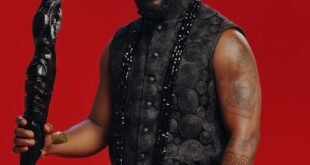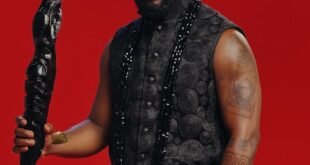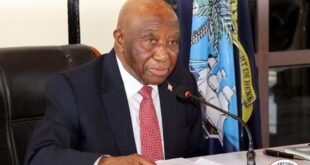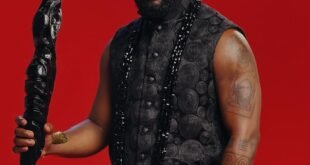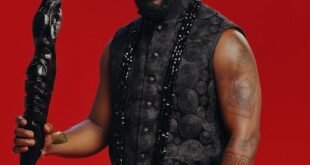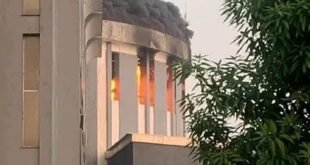In what appears to be an emerging divide within the judicial system, the Supreme Court of Liberia has boycotted celebration of Law Day here, organized by the Liberian National Bar Association after the Bar recently criticized the High Court’s ruling.
By Stephen G. Fellajuah
Monrovia, Liberia, May 5, 2025 – In an unexpected move that underscores growing tension within the legal system here, Justices of the Supreme Court of Liberia, including Her Honor, Chief Justice Sie-A-Nyene G. Yuoh, have been notably absent from this year’s Law Day celebration organized by the Liberian National Bar Association (LNBA).
The absence of the full bench, which has been traditionally present and accorded a special role during the annual legal observance, was particularly striking, as Chief Justice Yuoh was scheduled to have delivered the official Law Day message.
No formal explanation was provided regarding the High Court’s decision to boycott the event.
Held under the theme “Justice, Accountability, and Inclusion: Building a Stronger Liberia Under the Rule of Law,” the 2025 Law Day program took place at the Ellen Johnson Sirleaf Ministerial Complex in Congo Town on Friday, May 2.
The occasion brought together legal professionals, government officials, civil society actors, international partners, members of the security forces, and students.
While Law Day is traditionally a celebration of the resilience and impact of law and lawyers worldwide, this year’s event took on a sharply political tone, owing to recent public criticism by the LNBA of the Supreme Court’s ruling or clarification on a Bill of Information filed earlier by Speaker J. Fonati Koffa. The High Court recognized Speaker Koffa as the legitimate Speaker of the 55th Legislature despite a government-backed majority bloc of the House elected Representative Richard Nagbe Koon as speaker.
The controversy centers on the Supreme Court’s December 6, 2024 ruling, which declared that any legislative sitting or action not in conformity with Articles 33 and 49 of the Constitution is ultra vires (beyond legal authority).
In an April 23, 2025, opinion, the Court reaffirmed that Speaker Koffa is the legitimate presiding officer of the House of Representatives and invalidated sessions held without his presence, despite his availability.
But the Liberian Bar, through its President, Cllr. Bornor M. Varmah, condemned the ruling, arguing that the Supreme Court overstepped its bounds by using a Bill of Information, a procedural tool intended only to clarify, not to re-litigate a matter, to issue a second substantive opinion.
Cllr. Varmah warned that if the ruling is not reconsidered, it could cast doubt on the legitimacy of the 2025 National Budget and potentially nullify government transactions, payments, and salaries, a situation he described as a possible “criminal subversion of the government.”
His comments sparked both internal backlash and public debate, with critics accusing the Bar of undermining the judiciary.
However, addressing the Law Day celebration, former Chief Justice, Cllr. Gloria Musu Scott strongly rebuked the LNBA President’s public condemnation of the Supreme Court.
“Whether we like it or not, we must respect the opinion of the Supreme Court,” she said. “When the Court speaks, it is final.”
Describing herself as an “elder of the land,” Cllr. Scott warned against politicizing legal institutions and cautioned the Bar against stepping into political territory under the guise of legal advocacy.
“You don’t reject or disrespect the Court’s decision,” she emphasized. “The law clearly states that no lawyer shall do anything to undermine the integrity of the Court.”
She urged the LNBA leadership to act with sobriety and conscience, noting the significance of the role it plays in a fragile democracy.
In remarks earlier, Cllr. Varmah reaffirmed the Bar’s commitment to legal aid, access to justice, and democratic governance. Despite the controversy, he maintained that the Bar must continue to speak out in defense of the rule of law.
“Let us reaffirm that no one is above the law, and that a fair and inclusive justice system is not a privilege, but a right for all,” he said, adding “Democracy is not merely about elections; it is about institutions, accountability, and, above all, justice.”
The Supreme Court’s absence and the exchange of criticisms between senior members of the legal fraternity have ignited broader conversations about the independence of legal institutions, the ethical limits of professional associations, and fragility of democratic norms in post-conflict Liberia.
As Law Day traditionally serves as a moment of unity and reaffirmation of legal principles, this year’s discord suggests deeper fractures within the nation’s justice sector, fractures that may require more than ceremonial gestures to mend. Editing by Jonathan Browne
 JamzNG Latest News, Gist, Entertainment in Nigeria
JamzNG Latest News, Gist, Entertainment in Nigeria




